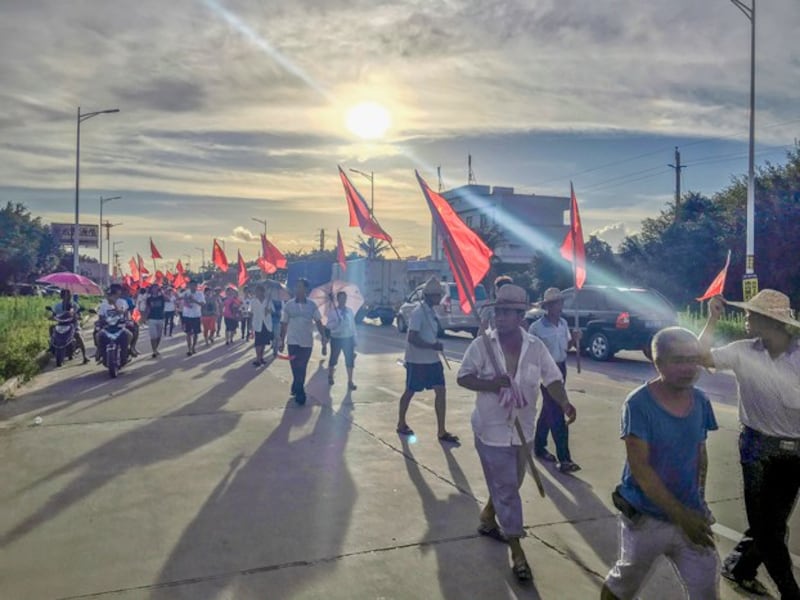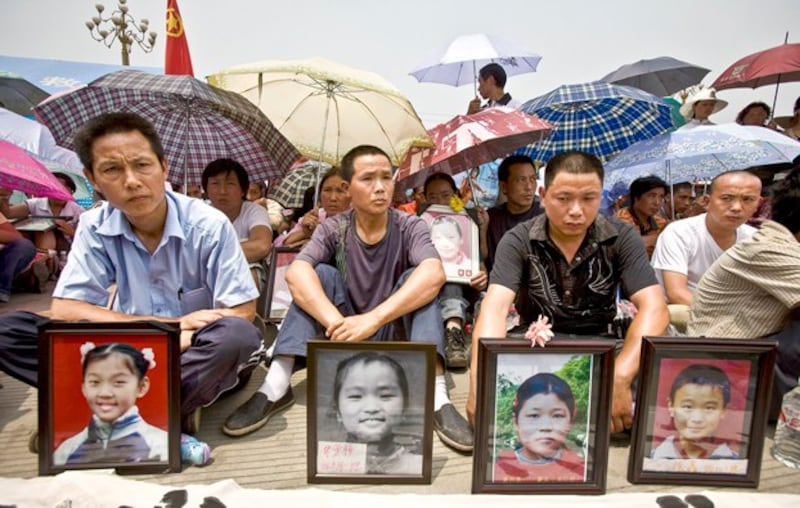Twelve years ago, Xia Ming, a politics professor at The City University of New York, published a book in Hong Kong titled “Political Venus,” which examined possible pathways towards a more democratic China.
He recently sat down with RFA Mandarin to revisit the book in the light of more recent events, including an indefinite third term for ruling Chinese Communist Party leader Xi Jinping, a flagging economy, ongoing tensions between cash-strapped local governments and Chinese citizens, and the 2022 " white paper" movement that brought an end to three years of draconian restrictions under Xi's zero-COVID policy. The following is an edited translation of the original interview:
RFA: How is democracy relevant to China today?
Xia Ming: I think one of the most specific implications for China today is that every Chinese person could potentially play a role in changing their destiny, in determining the future development of the country, and their own basic right to survival.
In a democracy, the country belongs to the people, is governed by the people, and enjoyed by the people. China today is totally owned and enjoyed by those in power. The main benefits of China's economic development over the past 40 years have actually been monopolized by bureaucrats or oligarchs.
When the economy is doing well, the people don't see many of the benefits, especially migrant workers and the rural population. But when there's an economic crisis, ordinary people bear the brunt of the impact, or are cut out of the economy altogether. The most fundamental thing here is that there's no democratic, decision-making body.
RFA: In your book, you talk about the elite a lot — differentiating between the political, intellectual and economic elite. Why is that differentiation important?
Xia Ming: The idea of an elite ... includes not just the political elite, but also the economic and cultural elite. They can, in a pluralistic society, cooperate with and keep an eye on each other, in service of that society.
In China, Mao was a populist ... a marginalized person [who] actually wiped out elite culture in China, including its traditional culture. Economic reforms gradually saw the emergence of a new group of elites, via the college entrance examination, through market economics, and through celebrity culture in sports, economics, politics and education.
The problem today isn't that these elites exist; it's that the Chinese Communist Party wants to take all the winnings for itself. It wants the political elite to subjugate all of the other elites, and take their jobs. In other words, Chinese Communist Party leaders now want to be doctoral supervisors, hold Ph.D.s, be the richest people, and be on the front page of every newspaper.

RFA: What about the people at the bottom of the ladder? What role could the lowest socioeconomic class play in China's democratization?
Xia Ming: Over the past 40 years, awareness of democracy and human rights has been constantly on the increase among those at the bottom rungs of Chinese society.
My own research ... has shown that these people are increasingly aware of their rights, and at the same time, are less and less dependent on the regime. People are also increasingly taking part in "mass incidents," which is to say, collective forms of resistance.
China basically stopped publishing its own data on mass incidents in 2008, but the last time I saw any of the data, there were about 140,000 mass incidents a year. Mass incidents [protests and demonstrations] take place every day in every province of China.
I believe that when the Chinese people stand up for their own rights and interests, they inflict structural wear and tear on the Communist Party's authoritarian system, which causes structural fatigue. That system could be forced into changing when the government finally discovers that the benefits of running this system no longer outweigh the costs.
RFA: Right now in China, there is a totalitarian system in which all of the elites depend on the system, on the political elite. How can this be avoided?
Xia Ming: During Jiang Zemin's time in power, particularly before 2007, there was a tendency within the Chinese Communist Party to push the party in the direction of social democracy. [Jiang's] Three Represents ideas intended to turn it into a party with diverse social interests, which meant opening it up to private entrepreneurs and encouraging capitalists to join. So it's possible for that mechanism to loosen up in certain situations.
[This continued until] Hu Jintao and Xi Jinping went to war on civil society. At that time, the accumulation of civil power and the proliferation of civil society groups actually posed a huge threat to party rule, yet that change was promoted by leaders from within the party. That's why I'm still hopeful that some change will come from within the Chinese Communist Party itself.
RFA: Looking at the suppression of the private sector in China today, is it fair to say that China's current supreme ruler wants to downplay or even eliminate the role of other elite groups?
Xia Ming: Yes. There is a winner-takes-all attitude among the political elite in China right now, which is suppressing and even devouring the other elite groups. For example, people like Jack Ma are being forced to redistribute all their assets and shares.
The Chinese elite right now is a monopoly, with the political elite having the final say, even in the arts, in academia, and in education. That's why we see Xi Jinping Thought Research Centers wielding power over entire universities.
Another thing is that China now has a closed political elite. A more open elite would attract a lot of naturally talented people, who would form an influx from outside.
But now, the restrictions of the household registration system and educational reforms mean that the candidates for entry into the elite jobs are coming from the second generation of officials, the second generation of rich people, and the second generation of revolutionary families.
So, the influx of people into that group has been shut down, and the elite is now closed, which means that they ... live lives that are totally separate from those of ordinary people, and that they are willing to sacrifice the interests of the majority to serve their own interests.
This tendency towards oligarchy is very pronounced. That's why the Chinese Communist Party is cracking down on the private sector. The ongoing harvesting of assets from private enterprises strengthens the power of the state.

RFA: In the book, you also talk about the “gangsterization” of Chinese politics alongside the tendency towards mass incidents. Why do you see these two processes as parallels?
Xia Ming: We have a tendency to mythologize the Chinese Communist Party's ability to govern. Yes, China's ability to govern itself is far greater now than it was in imperial times, because it's a centralized government based on technology, on high-tech equipment, that makes it very effective.
But we shouldn't be too superstitious about its effectiveness. The regime is actually failing in a lot of places, and is quite incompetent. These failings manifest particularly further down the social ladder, and it has failed to penetrate into a lot of places, particularly rural areas. There are a lot of places in which it's failing.
There are so many police in China, but they are mostly concentrated in the big cities. That leaves a lot of space for China's jianghu culture, which is a Chinese tradition in which the most marginalized people look out for their own survival, because their lives are seen as cheap anyway.
This underworld offers a channel for social mobility, via the collusion that exists between gang bosses and corrupt officials in local governments, who let the gangs do a lot of their dirty work for them. So, the lowest levels of government in China have been “gangsterized.”
RFA: You argue in the book that people's anger is often directed at local governments, and that they tend to idealize the role of the central government. Do you think that has changed much since the three years of the zero-COVID policy?
Xia Ming: The Central Committee of the Communist Party of China is still playing this political game, acting as peacemaker in the event of conflicts between local people and local governments, offering some concessions to the people, criticizing the local government, and appearing to solve the problem. This pattern continues today.
One of the most prominent manifestations is the huge local government debt crisis, which has triggered conflicts with ordinary people, particularly when it comes to local government financing platforms. It's still leaving it to local governments to handle those conflicts with the people.
Now that the flow of revenue from real estate has collapsed, people are becoming more aware that everything their local government is doing is directly linked to central government [policy]. So, when Xi Jinping says the party should lead in everything, across the whole country, he's also making himself the target for lightning to strike in the form of popular unrest. So, it's harder under the current circumstances for the central government to avoid accountability.
RFA: During the “white paper” protests of November 2022, the first to stand up and resist were the educated children of the urban middle class. They were the reason that the zero-COVID policy was lifted. Are these people now the main force for change in China?
Xia Ming: I'm reading a book by [former New York Times China correspondent] Ian Johnson called "Sparks." He talks about how intellectuals and independent historians have kept this spark alive over the past few decades in China, by spreading ideas and keeping a record of wrongdoing by the Chinese Communist Party, constantly driving away the darkness.
He muses that the sparks may just be like flickers of candlelight, but could one day turn into bright sunshine. When I wrote “Political Venus,” I was trying to keep that spark alive.
Translated by Luisetta Mudie . Edited by Roseanne Gerin.
